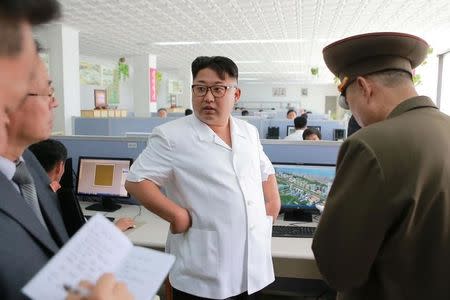From Pyongyang with love - North Korea restarts coded spy broadcasts

By James Pearson SEOUL (Reuters) - "Now we'll begin a mathematics review assignment for members of the 27th expeditionary unit of the distance learning university," the woman's voice crackled over the radio. "Turn to page 459, question 35; 913, question 55; 135, question 86." Isolated North Korea has restarted coded radio broadcasts, presumed to be targeted at its spies, for the first time in 16 years last month, South Korea said on Wednesday. The messages, a recording of which was broadcast by South Korean TV channel KBS, were disguised as a mathematics lesson for distance learners and reappeared on North Korean radio station Voice of Korea in the early hours of Friday. North and South Korea are still technically at war after the 1950-53 Korean War ended in a truce, not a peace treaty, and tensions are running high. North Korea, which has carried out a string of rocket and nuclear weapons tests in defiance of UN Security Council resolutions, said on Wednesday it had conducted a ballistic missile test that simulates strikes against South Korean ports and airfields used by the U.S. military, apparently referring to three missile launches on Tuesday. Those missile launches were seen as a show of force a week after South Korea and the United States chose a site in the South to deploy the Terminal High Altitude Area Defence (THAAD) anti-missile system to counter threats from the North. FOR YOUR SPIES ONLY The radio messages, also known as numbers stations, work by broadcasting strings of seemingly random numbers over shortwave signals to an agent in the field. The technique, a method of sending one-way secret messages, dates to the French Resistance in World War Two and is still in use by some governments today. South Korea jams most North Korean radio frequencies but Pyongyang-based Voice of Korea broadcasts on shortwave signals which can be picked up far beyond the Korean peninsula, and are difficult to jam. The receiving agent, armed with a radio and a pen, uses an easily concealed pad with corresponding letters on it to listen to and decrypt the secret message. "(North Korean) numbers broadcasts have been on hold for quite some time but have recently resumed, something we think is very regrettable," Jeong Joon-hee, a spokesman for South Korea's unification ministry, told a media briefing on Wednesday. It was not clear whether the signals were meant to deceive or deliver genuine instructions. "I can't speak to their intentions, but we hope that the North will refrain from an old practice like this and behave in a manner that's conducive to improving South-North ties," Jeong said. Seoul has also operated a numbers station, former agents told Reuters in 2013. Officials at the National Intelligence Service were not immediately able to confirm their use. South Korea's station is known as "V-24" to amateur radio enthusiasts who have tracked the source of the signal to a location somewhere south of the Demilitarised Zone separating the two Koreas, and has been known to begin with a scratchy rendition of Beethoven's Piano Sonata No 8. (Corrects time of broadcasts resuming in paragraph 3) (Additional reporting by Jack Kim; Editing by Nick Macfie)

